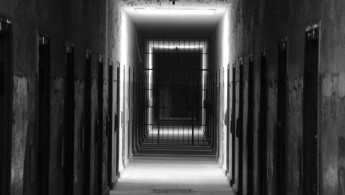Farhad Meysami: Alarm grows over health of Iran hunger-striker
Alarm grew on Friday over the health of a jailed Iranian medical doctor and human rights campaigner after images of his emaciated body revealed the effects of a weeks-long hunger strike.
Farhad Meysami, serving a five-year sentence and in jail since 2018, has been refusing food for several weeks in protest at authorities' crackdown on anti-regime rallies, campaigners say.
His lawyer Mohammad Moghimi posted on Instagram images of the gaunt, skeletal naked torso of Meysami, who is jailed in the Rajai Shahr prison, in the city of Karaj outside Tehran.
It was not immediately clear how the images had been taken.
"My client is a political activist who lost weight severely due to the hunger strike in prison," Moghimi wrote.
He said Meysami was on hunger strike to demand an end to executions linked to the protests, the release of political prisoners and an end to the compulsory dress code for women in Iran.
Amnesty International described the images as "shocking" and said they raised "grave concerns about his health and life after more than a month on hunger strike".
"These images of him are a shocking reminder of the Iranian authorities' contempt for human rights," it added on Twitter.
Iranian human rights defender Farhad Meysami must be immediately and unconditionally released. pic.twitter.com/ExWNCslw7h
— Amnesty International (@amnesty) February 3, 2023
The US envoy for Iran, Robert Malley, also said the images were "shocking".
"Iran's regime has unjustly denied him and thousands of other political prisoners their rights and their freedom. Now it unjustly threatens his life."
It was not immediately clear how long Meysami has been on hunger strike. Some reports said his action dated back to October, others that it had lasted for a month.
The US-based Center for Human Rights in Iran (CHRI) said he had lost more than 50 kilogrammes (110 pounds) through his action.
One of Iran's longest serving political prisoners, Meysami was arrested in July 2018 while campaigning in favour of the abolition of the obligatory headscarf and convicted on national security charges.
"Meysami was one of the first male activists to go to prison in Iran for demanding an end to the compulsory hijab for women," said CHRI deputy director Jasmin Ramsey.
"He has sacrificed everything to demand basic rights for the Iranian people," added Ramsey.
"The international community should stand with him by amplifying his calls and by demanding his freedom to prevent the death of another political prisoner in Iran."
Iran has arrested thousands of people, including prominent activists, in the crackdown on the protests that erupted in September after the death of Kurdish Iranian Mahsa Amini who had been arrested for allegedly violating the dress code.





 Follow the Middle East's top stories in English at The New Arab on Google News
Follow the Middle East's top stories in English at The New Arab on Google News
![Netanyahu furiously denounced the ICC [Getty]](/sites/default/files/styles/image_330x185/public/2024-11/GettyImages-2169352575.jpg?h=199d8c1f&itok=-vRiruf5)
![Both Hamas and the Palestinian Authority welcomed the ICC arrest warrants [Getty]](/sites/default/files/styles/image_330x185/public/2024-11/GettyImages-2178351173.jpg?h=199d8c1f&itok=TV858iVg)
